As part of Brookdale Community College’s Global Citizenship Project’s lecture series, UCI Associate Director Tom Herrington gave a virtual talk on Feb. 9 about the impact of rising sea levels on coastal communities. The lecture was sponsored by the American Library Association and moderated by Brookdale Assistant Professor Judith Ungar.
-
Herrington Lecture Examines Sea Level Rise Threat to Coastal Communities
-
Student Researcher Examines Climate Change Communication in India
 Graduate student Lisha Samuel recently completed a paper detailing her fall research on climate change communication in the city of Kolkata, India. Rechnitz Family/Urban Coast Institute Endowed Chair in Marine and Environmental Law Randall Abate served as a faculty mentor and the project was supported with funding from the UCI.
Graduate student Lisha Samuel recently completed a paper detailing her fall research on climate change communication in the city of Kolkata, India. Rechnitz Family/Urban Coast Institute Endowed Chair in Marine and Environmental Law Randall Abate served as a faculty mentor and the project was supported with funding from the UCI.Update: Her paper was published as chapter 10 (with Prof. Randall Abate as a co-author) in the book “Climate Change and Risk in South and Southeast Asia: Sociopolitical Perspectives” (Routledge, 2022).
We caught up with Lisha recently to ask a few questions about her takeaways from the project. You can also watch this video of her talk on the topic from Monmouth University’s fall Climate Teach-In.
Paper Title: Climate Change Communication in Kolkata: Applying Communication Theories to Address the Threat of Climate Change Displacement
Student Researcher: Lisha Samuel
Year and Major: Graduated December 2020 with a master’s degree in communication
Q: What interested you in exploring the topic of climate change communication and why did you choose Kolkata, India, as a case study?
Climate change communication is a fairly a new topic. I have always been interested in climate change and my background in communications was a great fit as I wanted to conduct research on the Indian media and use communication theories for my proposal. My reason for choosing Kolkata was because I grew up in India and understand India’s mindset towards climate change. I wanted to learn more about India’s approach to climate change and how the coastal communities were being affected. Kolkata is the second largest city in India after Mumbai (where I grew up). It was a valuable focus for the paper because it is a city that is surrounded by rivers and is the fourth most vulnerable city in India to sea-level rise.
Q: Your paper notes that you found many “missing links” in climate change communication in India. What were some of the most significant and what risks might those gaps pose for the populace of vulnerable areas?
There are two major gaps in climate change communication in India. The first is a language barrier because most news coverage is conducted by English-language newspapers. In India, different states speak different languages; therefore, vulnerable populations that do not speak English do not receive appropriate information and warnings about climate change threats. The second gap is the Indian mindset on climate change. Indians believe that climate change is a Western concept and that they are being burdened with a responsibility that should be shouldered by Western developed nations. Due in part to the Indian’s government failure to recognize the importance of climate change policies, only 7% of the Indian population knows what climate change is. The coastal vulnerable areas are facing severe challenges due sea-level rise; however, they lack the resources or knowledge to adapt to these impacts, including the threat of forced migration.
Q: What do you believe can be done to improve climate change communication in Kolkata?
The media can be a very effective mechanism to increase climate change communication in India. Incorporating an agenda to report climate change and tell the public compelling stories about climate change impacts would help increase awareness of climate change. Using All India Radio (radio available throughout India), creating more animated short documentaries, increasing the number of trained journalists, and engaging popular Bollywood actors and cricketers would facilitate this necessary transition in communicating the imminent threat of climate change in Kolkata.
-
Video: Panel Talk on Governance of Marine Shipping and Maritime Sovereignty in the Climate Change Context
The Monmouth University Institute for Global Understanding (IGU) and Urban Coast Institute (UCI) hosted “Global Perspectives on Adapting Marine Shipping Governance and Maritime Sovereignty to Respond to Climate Change” on Feb. 19, 2021. The event was part of the IGU-UCI Global Ocean Governance Lecture Series, which assembles international experts to discuss scientific and policy issues that hold important implications for coastal and marine ecosystems. The discussion was moderated by Professor Randall Abate, director of the IGU, and included the following presentations and speakers:
 “Climate Change and Global Marine Shipping Governance,” by Beatriz Martinez Romera, University of Copenhagen (Denmark)
“Climate Change and Global Marine Shipping Governance,” by Beatriz Martinez Romera, University of Copenhagen (Denmark)- “Applying the Atmospheric Waqf Principle in Muslim Countries to Promote Nature’s Trust in the Marine Environment,” by Samira Idllalène, Cadi Ayyad University (Morocco)
- “Maritime Sovereignty of Submerged Pacific Islands,” by Joanna Siekiera, University of Bergen (Norway)
Abstracts & Bios
Climate Change and Global Marine Shipping Governance
ABSTRACT: If they could be accounted as a country, greenhouse gas emissions from maritime transport would be one of the world’s top 10 emitters. Moreover, shipping emissions are forecast to increase 50-250% by 2050 and the contribution of shipping to climate change will further intensify, as routes in the Arctic become available. In spite of this, shipping remains largely unregulated, being the last sector of the economy to contribute to climate change mitigation targets in line with the Paris Agreement. This presentation will examine the legal and regulatory frameworks of the United Nations Framework Convention on Climate Change (UNFCCC) regime, the International Maritime Organization, and the role of the European Union in regulating climate-related impacts from shipping.

PRESENTER BIO: Dr. Beatriz Martinez Romera is associate professor of environmental and climate change law at the University of Copenhagen Faculty of Law. Martinez Romera has a keen interest in the international climate negotiations, and the regulatory processes at the International Civil Aviation Organization and the International Maritime Organization, as well as the developments at the EU level. Her research includes environmental and climate change law and policy; aviation and maritime transport sectors; law-making processes at international and EU levels; environmental taxation, carbon pricing and related fiscal measures; renewable Energy; fragmentation of international law and regime interaction; environmental and climate-related regulation of the Arctic; ocean governance; and corporate environmental responsibility. She has been teaching climate change law for the last 10 years, and is the founder of TRAMEREN (Transatlantic Maritime Emissions Research Network with NYU School of Law) and ArcEnGov (Arctic Environmental and Climate Change Governance Network with Canadian Research Institutions).
Applying the Atmospheric Waqf Principle in Muslim Countries to Promote Nature’s Trust in the Marine Environment
ABSTRACT: The public trust doctrine is an important legal tool used in common law countries. It imposes limits on governmental action and provides public access rights to trust resources. The public trust doctrine is grounded in common law principles as it stems from the principle of the trust. This principle exists also in Islamic law. The public trust doctrine provides a legal framework for protecting maritime resources and the global climate system. Around the world, climate change litigation is based on the principle of the public trust (atmospheric trust litigation). Comparatively, in Muslim countries, the principle of the trust (called Waqf) has fallen into disuse for political and historical reasons. A revival of the trust in Muslim countries in the Middle East and North Africa (MENA) region and Indonesia can benefit from a comparative law perspective (common law and Islamic law). A closer analysis of Waqf can reframe the environmental legal system and enhance international efforts for environmental action. Therefore, Islamic environmental law could find synergistic opportunities at the global level in the growth of the spiritual ecology movement (Eco-Islam) and at the domestic level in conjunction with Islamic finance. This paradigm shift is urgent and necessary to protect marine resources, especially given the stresses that the marine environment is experiencing from climate change impacts.

PRESENTER BIO: Dr. Samira Idllalène is a professor of law at Cadi Ayyad University at the polydisciplinary Faculty in Safi, Morocco. She teaches environmental law, law of the sea, international law, and comparative law. She is the author of several publications in coastal environmental law in Morocco. Idllalène was a visiting associate professor at the University of Oregon School of Law as part of a Fulbright grant. She also has taught marine environmental law at the Higher Institute of Maritime Studies (Casablanca) as part of the Advanced Cycle in Maritime Affairs in collaboration with the University of Quebec in Rimouski (Canada). Idllalène is member of the Jury: Trophy of Her Royal Highness the Princess Lalla Hasnae “Sustainable Coastal Zone” (Littoral durable) and board member of the Moroccan Association for the Protection of the Underwater Cultural Heritage. She is a partner with Environmental Law Alliance Worldwide (ELAW) and pro bono legal consultant in environmental law for several Moroccan NGOs and for the Economic, Social and Environmental Council (CESE) and the National Fisheries Research Institute (INRH). Idllalène holds a Ph.D. in marine environmental law from the University of Western Britanny in Brest (France), a master’s degree in maritime studies from the same university, and a degree in comparative law from the International University of Comparative Law (Strasbourg-France).
Maritime Sovereignty of Submerged Pacific Islands
ABSTRACT: Global climate change scenarios are seen as future concerns, but this is not the case for the Pacific island countries and territories (PICT). The natural sciences have already built substantial knowledge about the oceanographic, geological, and atmospheric processes associated with global warming and ocean change. Nonetheless, input from the social sciences and the law needs to be collected, analyzed, and executed to determine what happens when climate change impacts threaten the viability of sovereign states. Small island developing states (SIDS) contribute the least to global climate change, yet they are suffering the most from its effects, while the legal consequences of losing the most or all of their territory will threaten loss of sovereign status for those states in the international arena. As the largest water basin on Earth, the Pacific Ocean remains an isolated region in terms of geopolitics and research. This presentation examines the future of the Pacific states regarding their recognition as equal entities among other sovereign states and offers some international law proposals on this issue. The presentation also seeks to sensitize European and American audiences to certain issues of the geographically remote South Pacific that may eventually have impacts for the global community. Threats to human security, food security, land security, and statehood will also be addressed.

PRESENTER BIO: Dr. Joanna Siekiera is an international lawyer and doctor of social sciences in public policy sciences. Since 2019 she has worked as a postdoctoral fellow at the University of Bergen. She was a scholarship holder of the New Zealand Government at the Victoria University in Wellington in 2015-16. She defended her doctoral thesis in 2017 at the Collegium of Socio-Economics of the Warsaw School of Economics in Poland on regional policy of the states in the South Pacific. Siekiera researches public international law, the law of the sea, and (ocean) science diplomacy. Her specialization is legal and political relations in the South Pacific. She works as a legal adviser on the Research Council of Norway grant “Mare Nullius” at the Bergen Pacific Studies Research Group. Her work on this project focuses on the legal consequences of ocean change and sea level rise on the sovereignty of states in the Pacific. Siekiera is the author of over 80 scientific publications in several languages, as well as co-author of three monographs. She is a participant in 11 scientific grants from the European Union, Norway, and Poland and is a co-investigator on the Worldwide Universities Network grant.
-
Adolf to Lead Governor’s Harmful Algal Bloom Expert Team
Monmouth University Endowed Associate Professor of Marine Science Jason Adolf has been selected to lead a Harmful Algal Bloom (HAB) Expert Team formed to provide guidance to the New Jersey Department of Environmental Protection (NJDEP) on HAB prevention, mitigation and management for the state’s lakes and other waterbodies.
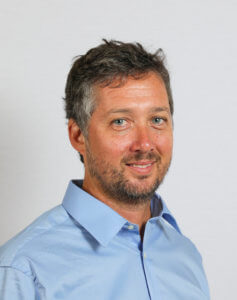 Through an initiative launched by Gov. Phil Murphy, the NJDEP Division of Water Monitoring and Standards and the New Jersey Sea Grant Consortium recruited Adolf and nine other cyanobacterial HAB and lake management experts to help build the state’s capacity for HAB response. The team will complete a comprehensive literature review on the prevention and treatment of HABs, examine HAB and water quality data, and develop guidance documents for New Jersey lake managers that include best management practices for the prevention and management of HABs.
Through an initiative launched by Gov. Phil Murphy, the NJDEP Division of Water Monitoring and Standards and the New Jersey Sea Grant Consortium recruited Adolf and nine other cyanobacterial HAB and lake management experts to help build the state’s capacity for HAB response. The team will complete a comprehensive literature review on the prevention and treatment of HABs, examine HAB and water quality data, and develop guidance documents for New Jersey lake managers that include best management practices for the prevention and management of HABs.The team will also provide technical advice and reviews on proposed mitigation technologies for lakes and review the progress of NJDEP-funded HAB mitigation grant projects. Additionally, the team will develop a HAB lake management training program for NJDEP staff and interested stakeholders and conduct training workshops at various locations in the state. More information on HABs in New Jersey and the governor’s initiative can be found at nj.gov/dep/hab/.
The HAB issue gained increased statewide attention in 2019, when lengthy closures at the summer tourism destinations of Lake Hopatcong and Greenwood Lake strained local economies. In an op-ed published by New Jersey news outlets at the time, Adolf warned that the situation could have been far worse, as toxin levels remained relatively low in the lakes even though HAB biomass was elevated. However, he wrote that “it is only a matter of time before our luck runs out.”
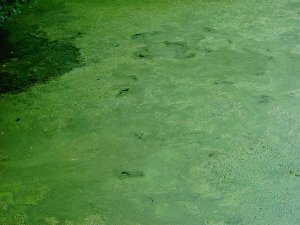
A harmful algal bloom in Deal Lake. “The impacts of humans, including excess nutrient loading to lakes, elevated CO2 levels and rising water temperatures due to climate change, will not only ensure the reoccurrence of these blooms but stack the odds in favor of them becoming toxic and a far more menacing public health threat than what we currently see in New Jersey,” Adolf wrote. “Research into these linkages must play an important role in directing actions for solutions.”
Adolf coordinates the Coastal Lakes Observing Network (CLONet), an innovative citizen science effort that is building a greater understanding of the prevalence and causes of HABs in Deal Lake, Fletcher Lake, Lake Como, Lake Takanassee, Silver Lake, Spring Lake, Sylvan Lake, Sunset Lake, Wesley Lake and Wreck Pond. Adolf runs the Phytoplankton and Harmful Algal Bloom research lab (PHABLab) at Monmouth University, where he is also working with undergraduates to study HABs in Monmouth County surfing beaches and waterways including Sandy Hook and Raritan bays and the Shrewsbury and Navesink river watersheds.
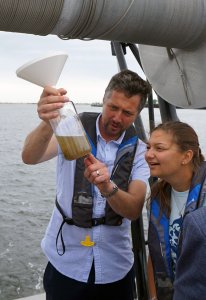 He joined Monmouth in 2017 after nine years at the University of Hawaii at Hilo, where he served as the chair and associate professor of marine science. Adolf, whose research background is in the field of phytoplankton ecology and evolution, has made significant contributions to the literature in the area of HABs. Before going to Hilo, he spent five years at the University of Maryland Institute of Marine and Environmental Technology in Baltimore, conducting HAB research that included Chesapeake Bay; the Swan River Estuary in Perth, Western Australia; and the Plymouth Culture Collection of the Marine Biological Association of the U.K.
He joined Monmouth in 2017 after nine years at the University of Hawaii at Hilo, where he served as the chair and associate professor of marine science. Adolf, whose research background is in the field of phytoplankton ecology and evolution, has made significant contributions to the literature in the area of HABs. Before going to Hilo, he spent five years at the University of Maryland Institute of Marine and Environmental Technology in Baltimore, conducting HAB research that included Chesapeake Bay; the Swan River Estuary in Perth, Western Australia; and the Plymouth Culture Collection of the Marine Biological Association of the U.K. -
Student Film Explores Climate Gentrification Threat, History of Redlining in Asbury Park’s West Side
A short documentary created by Monmouth University student London Jones examines the possibility that economic pressures caused by factors such as sea level rise and increased coastal flooding could one day push minorities from Asbury Park’s West Side community through a process known as climate gentrification.

London Jones The film includes interviews with Monmouth University professors Melissa Alvaré, who discussed climate gentrification’s impacts around the country, and Walter Greason, who provided historical context on how “redlining” once shaped the West Side and left it particularly vulnerable today. According to Greason, the now illegal practice of redlining began in the 1930s and involved lenders grading neighborhoods based on racial composition, thereby depressing property values and investment in places like the West Side. However, Jones notes that as climate change makes today’s more affluent beachfront areas less desirable, residents could retreat inland and displace residents in areas like the West Side.
“Today, the West Side still houses the majority of Asbury Park’s minority communities and is characterized as a lower-income community compared to the east,” Jones observed in the film. “This financial reality disproportionately burdens its members when disasters occur, or in this case, climate change-induced sea level rise. While the West Side’s current residents — some whose families have resided there for the past 100 years — may not be concerned with sea level rise ruining their legacies and livelihoods, they might be when it washes away any hope of passing that part of town down to their future generations.”
The video, “Keep the Culture, Change the Fate: Responding to the Threat of Climate Gentrification to Asbury Park’s West Side,” was produced as an honors credit project in Jones’ Climate Change and the Voiceless course, taught by Rechnitz Family/Urban Coast Institute (UCI) Endowed Chair in Marine and Environmental Law and Policy Randall Abate. The project builds on her UCI-supported summer research work examining discriminatory barriers to beach access in Asbury Park and other New Jersey municipalities.
-
Video: Maritime Archaeology at Monmouth University
Professor Richard Veit and UCI Marine Scientist Jim Nickels recently brought their maritime archaeology class aboard the R/V Heidi Lynn Sculthorpe to scan for shipwrecks along the bottom of the Sandy Hook Bay and Shrewsbury River. Through this unique Monmouth University course, students explore the underwater history of New Jersey through readings, lectures and fieldwork, including the use of side-scan sonar and camera-equipped remote operated vehicle (ROV) technologies in area waters.
-
Citizen Science Data Indicates Climate Threat to Monmouth Coastal Lakes
With nearly 450 water quality samples collected by citizen scientists over the last 18 months, the data has begun to tell some stories about the condition of Monmouth County’s coastal lakes.
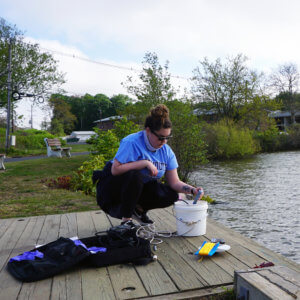 Those patterns were revealed by Monmouth University Endowed Associate Professor of Marine Science Jason Adolf during the second annual Coastal Lakes Observing Network (CLONet) Workshop, held virtually on Nov. 17 (scroll below for video and slides). The event also provided an opportunity for community volunteers who have sampled Deal Lake, Lake Como, Lake Takanassee, Sunset Lake, and Wesley Lake to share lessons learned and discuss next steps for the project heading into 2021.
Those patterns were revealed by Monmouth University Endowed Associate Professor of Marine Science Jason Adolf during the second annual Coastal Lakes Observing Network (CLONet) Workshop, held virtually on Nov. 17 (scroll below for video and slides). The event also provided an opportunity for community volunteers who have sampled Deal Lake, Lake Como, Lake Takanassee, Sunset Lake, and Wesley Lake to share lessons learned and discuss next steps for the project heading into 2021.According to Adolf, Secchi depth readings have been among the most telling indicators of the lakes’ overall health. These readings are taken by slowly lowering a black and white disc in the water and measuring the distance at which they are no longer visible. The deeper the visibility, the less turbid the lake.
Lake Takanassee in Long Branch has consistently shown the best depth – which lines up with other indicators showing its overall cleanliness – while Sunset Lake in Asbury Park has shown the poorest results to date. Adolf said that along a four-tier scale ranging from oligotrophic (best) to hypereutrophic (worst) conditions, the lakes on the whole fell in the latter category. Typical characteristics of hypereutrophic water bodies include an abundance of nutrients that fuel harmful algal blooms (HAB), low dissolved oxygen levels, occasional fish kill events, and the presence of thick scum and dense weeds.
“Even though Takanassee is relatively better than the other lakes, in general, we’re dealing with eutrophic to hypereutrophic systems,” Adolf said. “In terms of pollution and degradation, we’re at the bottom of the scale, which means we can only go up.”
Climate Threats Loom
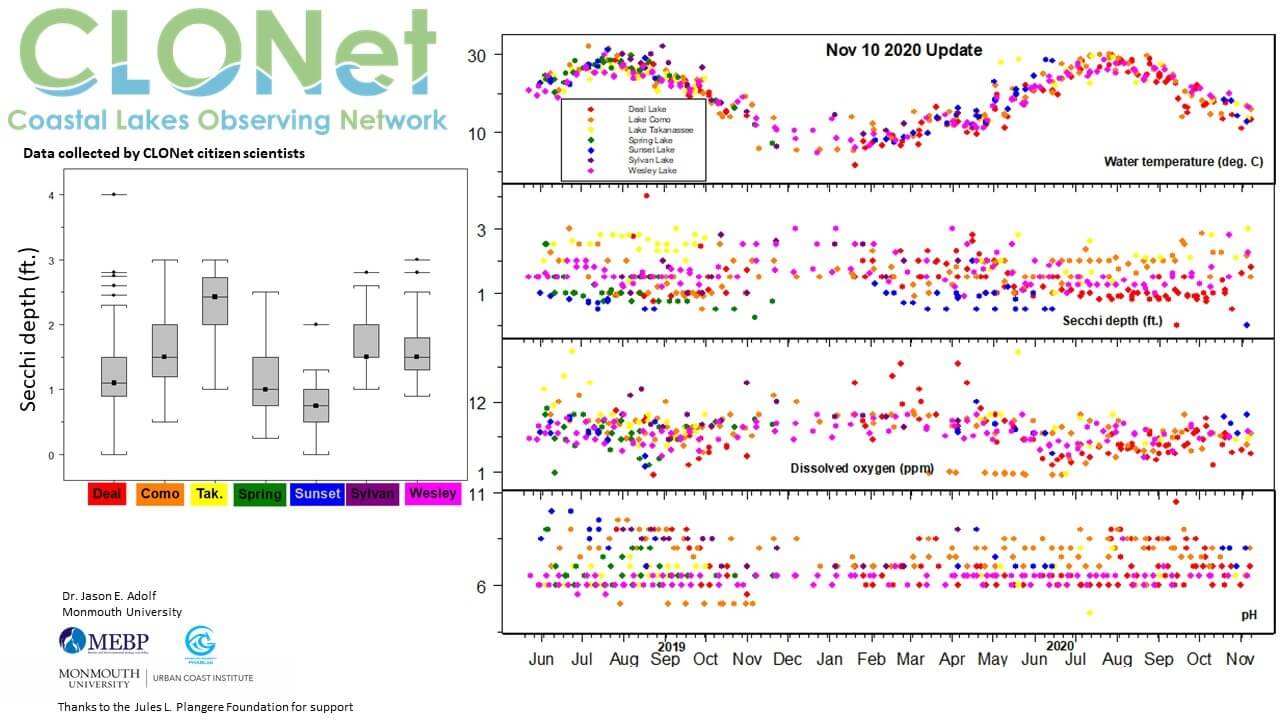
HAB organisms thrive in warm waters, especially those over 25 degrees Celsius (about 77 degrees Fahrenheit). With two summers of temperature readings now in the books, the data shows the lakes are most susceptible to HABs from June through September.
“This is something we can look at year after year and monitor whether this window is going to expand or contract as temperatures change with climate change,” Adolf said.
The analysis found a strong correlation between HAB events and rainfall, with spikes in the lakes frequently following storms during the warm season. This owes to the fact that stormwater runoff in these heavily developed areas carries nutrients such as fertilizers and animal wastes directly into the lakes.
“The climate predictions for New Jersey include increased rainfall and increased larger rainfall events,” Adolf said. “Considering how our coastal lakes seem to be responding to rainfall, that’s something we all need to be thinking about.”
Residents who observe a HAB in their lake can now report it online to the New Jersey Department of Environmental Protection (NJDEP). Vic Poretti of the NJDEP Division of Water Monitoring and Standards provided a tutorial on the agency’s HAB Interactive Map Reporting and Communication System, which gathers information including the location of the sighting, details about the lake and photos. Poretti said that although the issue of HABs in New Jersey drew more attention in 2019 due to high-profile closures at the summer tourism destinations of Lake Hopatcong and Greenwood Lake, there were actually more instances reported statewide in 2020.
Looking Ahead
CLONet’s capacity will expand in its third calendar year with the recent addition of Urban Coast Institute Citizen Science Coordinator Erin Conlon. A May 2020 graduate of Monmouth University’s Marine and Environmental Biology and Policy Program, Conlon has been working on the CLONet project since its inception and now leads citizen science trainings, checks data quality and provides equipment for volunteers. Conlon’s work and CLONet are made possible through a grant from the Jules L. Plangere, Jr. Family Foundation.
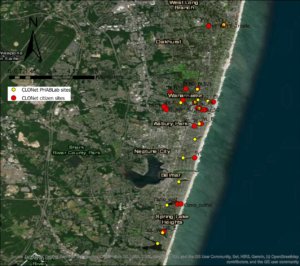 Conlon said her goals for 2021 are to increase communication between the community lake groups and build new research partnerships with outside organizations and other labs within Monmouth University. In one such partnership, CLONet will take the lead on the coastal lakes aspects of a NJDEP and U.S. Environmental Protection Agency study of HAB risks to New Jersey lakes. A phycocyanin meter donated by the Watershed Institute and NJDEP will allow CLONet to take direct measurements of the prevalence of HAB organisms in the lakes.
Conlon said her goals for 2021 are to increase communication between the community lake groups and build new research partnerships with outside organizations and other labs within Monmouth University. In one such partnership, CLONet will take the lead on the coastal lakes aspects of a NJDEP and U.S. Environmental Protection Agency study of HAB risks to New Jersey lakes. A phycocyanin meter donated by the Watershed Institute and NJDEP will allow CLONet to take direct measurements of the prevalence of HAB organisms in the lakes.Conlon said she hopes to expand CLONet to cover five additional coastal lakes in Monmouth County that are not currently being tested by citizen scientists, but have been by Monmouth University Phytoplankton and Harmful Algal Bloom Lab (PHAB Lab) students: Fletcher Lake, Silver Lake, Spring Lake, Sylvan Lake and Wreck Pond. Any individuals, schools or community groups interested in volunteering as citizen scientists are encouraged to contact Conlon at econlon@monmouth.edu. Visit the CLONet website for more information.
Video & Slides: CLONet 2020 Workshop
Slides from Workshop
- Jason Adolf (PDF, 3 MB)
- Erin Conlon (PDF, 2 MB)
-
UCI Awards Grants for Projects that Support and Research Socially Vulnerable Communities in Time of COVID-19
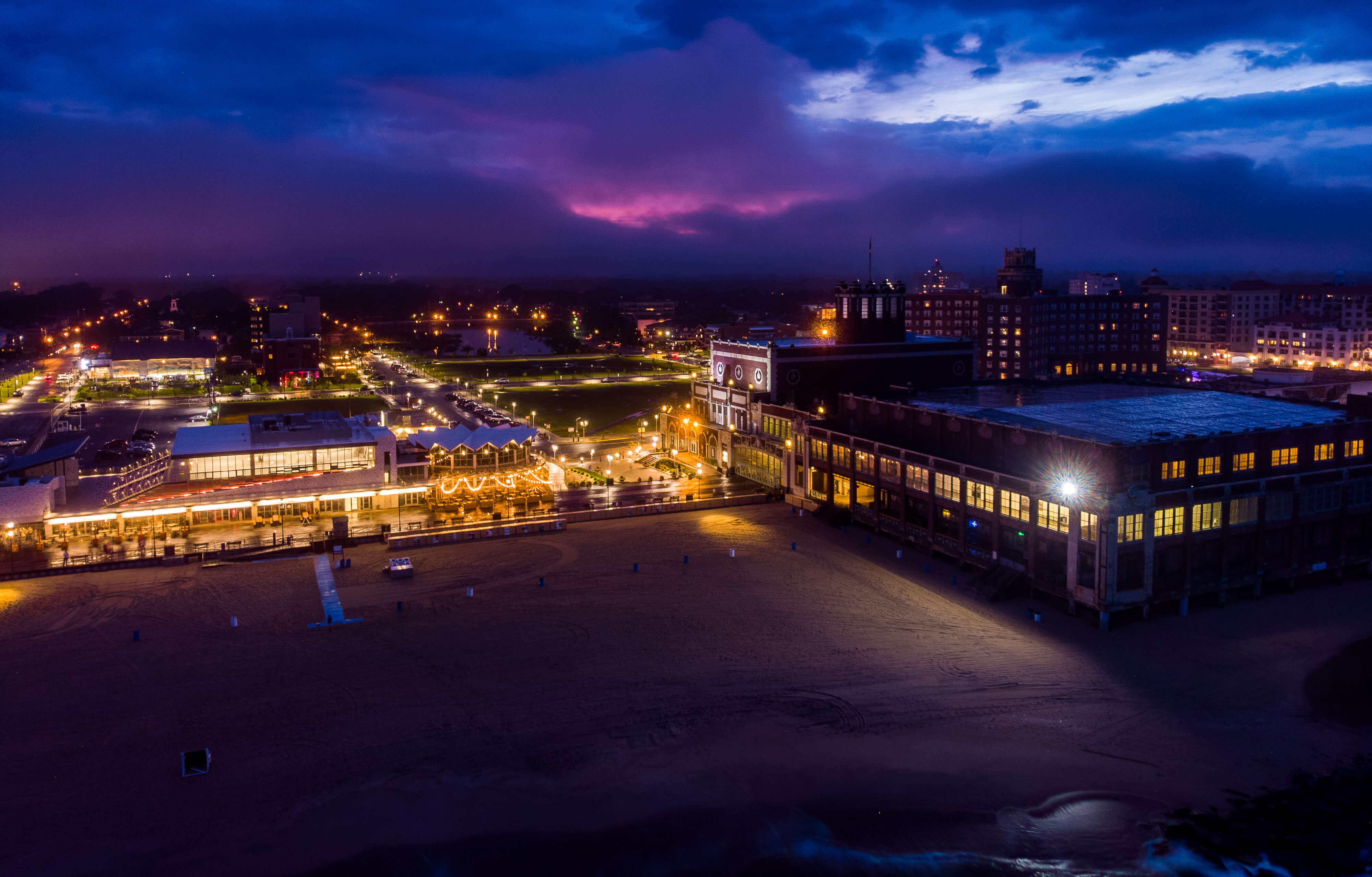
The Urban Coast Institute (UCI) has awarded Heidi Lynn Sculthorpe Faculty Enrichment Grants for projects that will create Little Free Library installations in low-income coastal communities and study COVID-19’s impacts on the African American community in Asbury Park, New Jersey.
In light of the continuing crises of the COVID-19 pandemic and concern about systemic racism, the UCI issued a special call for proposals in August to support faculty and student research and community-based projects focused on sustainably rebuilding our coastal communities and economies while addressing disproportional impacts to and needs of our most vulnerable populations. The call noted that environmental justice communities, including those of low income, communities of color, immigrant groups, and Indigenous peoples are disproportionately vulnerable to the environmental and health impacts of climate change and COVID-19.
The following are summaries of the two grant-funded projects. Both are currently underway.
Nourishing Book Deserts: Providing Access to Authentic and Relevant Interdisciplinary and Inclusive Books for Coastal Communities
Faculty Researchers: Kenneth Kunz, Jason Fitzgerald and Michelle Schpakow, Department of Curriculum and Instruction; Kurt Wagner, Monmouth University librarian; and Lori Burns, Department of Educational Counseling and Leadership
This project aims to counter the limited availability of books in the home in low-income coastal communities, an issue which has been exacerbated by virtual schooling and children’s reduced access to school libraries. Faculty researchers and students from the School of Education will initiate a process for local school districts to apply for the installation of Little Free Libraries in their communities. The grant will cover the purchase of texts and the materials to build the physical libraries, which will be designed by Monmouth University artists. Reading materials in the libraries will be coastal-relevant, interdisciplinary and inclusive to tackle the complex challenges facing their locations.
Paradoxical Paradise: Asbury Park, an African American Oral History and Mapping Project
Faculty Researchers: Hettie V. Williams, Geoffrey Fouad and Melissa Ziobro, Department of History and Anthropology
“Paradoxical Paradise” is a multiyear and multidisciplinary research, oral history and digital mapping project that seeks to document and preserve the African American history of Asbury Park. The grant will fund a phase of the project focused on COVID-19 and the experience of African Americans in the city as it relates to health disparities. Activities will include archival research led by Williams (with an emphasis on drawing parallels between the 1918 influenza pandemic and COVID-19); student interviews with residents guided by Ziobro; and the creation of GIS map products by Fouad and students that visualize COVID-19 health statistics in the area and the pandemic’s impacts on African Americans.
About the Program
The Heidi Lynn Sculthorpe Scholars program offers grant opportunities to students and faculty of all disciplines whose work advances core elements of Monmouth’s Strategic Plan and supports the UCI’s mission. The program is funded through the generosity of many corporate and private donors. If you would like to make a tax-deductible gift to the UCI, please click here. For more information, contact UCI Associate Director Tom Herrington at therring@monmouth.edu.
-
UCI-IGU Talk Examines Significance of High Seas Biodiversity Treaty
The Monmouth University Institute for Global Understanding (IGU) and Urban Coast Institute (UCI) hosted a Global Ocean Governance Lecture Series talk on Nov. 5 titled “Connected, Dynamic, at Risk: Coastal Nation Interests in a Strong New High Seas Biodiversity Treaty.” Lecture speakers included Rutgers University Associate Professor Cymie Payne and Guillermo Ortuño Crespo, a postdoctoral researcher at the Stockholm Resilience Centre and coordinator of early career professional engagement for the U.N. Decade of Ocean Science.
Further reading: The Debate: Time for the U.S. to Sign the Law of the Sea Treaty? (PDF, includes article by Payne)
ABSTRACT
Human exploitation of the open ocean has increased rapidly over the past few decades. International agreements that manage individual commercial sectors have not kept pace with the rate of expansion of maritime industries or the effects of climate change that are already being experienced, resulting in poor management of high seas species and ecosystems. Coastal nations like the U.S., with large exclusive economic zones (EEZs), may be the first to experience the negative impacts of poor management beyond their national jurisdiction: ecological connectivity across maritime boundaries connects hundreds of ocean species to the high seas. Years of negotiation are coming to fruition with a new treaty to manage conservation and sustainable use of life in the connected, dynamic global ocean. The challenge for governments is to prioritize long-term health over short-term sectoral interests with an effective treaty for biodiversity beyond national jurisdiction (BBNJ). It will be pivotal for ensuring the health and well-being of U.S. ecosystems and coastal communities.
BIOGRAPHIES
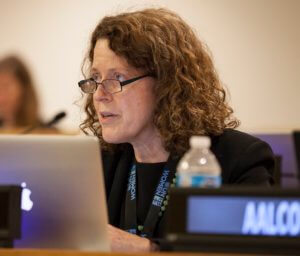 Cymie R. Payne is an associate professor at Rutgers University. She holds a joint appointment in the Department of Human Ecology and at Rutgers Law School. Professor Payne has appeared as counsel before the International Tribunal for the Law of the Sea in its deep seabed mining and fisheries advisory opinion cases. Currently, she is legal advisor to International Union for Conservation of Nature’s delegation to the intergovernmental conference for a legally binding agreement on conservation and sustainable use of biological diversity in areas beyond national jurisdiction and chair of the IUCN World Commission on Environmental, Ocean Coasts and Coral Reefs Specialist Group. She has also been a member of the Berkeley Law faculty and served as an attorney with the U.S. Department of the Interior, the law firm of Goodwin, Procter and the U.N. Security Council’s environmental war reparations program. Professor Payne holds a M.A. from The Fletcher School of Law and Diplomacy and a J.D. from the University of California, Berkeley.
Cymie R. Payne is an associate professor at Rutgers University. She holds a joint appointment in the Department of Human Ecology and at Rutgers Law School. Professor Payne has appeared as counsel before the International Tribunal for the Law of the Sea in its deep seabed mining and fisheries advisory opinion cases. Currently, she is legal advisor to International Union for Conservation of Nature’s delegation to the intergovernmental conference for a legally binding agreement on conservation and sustainable use of biological diversity in areas beyond national jurisdiction and chair of the IUCN World Commission on Environmental, Ocean Coasts and Coral Reefs Specialist Group. She has also been a member of the Berkeley Law faculty and served as an attorney with the U.S. Department of the Interior, the law firm of Goodwin, Procter and the U.N. Security Council’s environmental war reparations program. Professor Payne holds a M.A. from The Fletcher School of Law and Diplomacy and a J.D. from the University of California, Berkeley.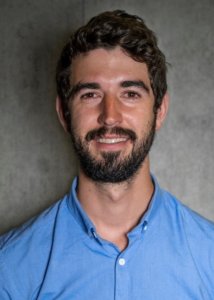 Dr. Guillermo Ortuño Crespo is a marine ecologist with a master of science from the University of St. Andrews in ecosystem-based management of marine systems and a doctorate in marine science and conservation from Duke University. Ortuño Crespo specializes in the spatial ecology patterns of distribution of both pelagic species (such as tuna, billfish and sharks) and that of pelagic fisheries (including purse seines and longliners) to identify areas of high risk and opportunity for sustainable fishing in the open ocean. He has been an active participant in the ongoing high seas BBNJ negotiations highlighting the importance of improving fisheries management beyond national jurisdiction through more transparent operations and a wider use of spatial management tools to reduce bycatch. Throughout his postdoc at the Stockholm Resilience Centre he will be working on a novel spatial management study in collaboration with the Inter-American Tropical Tuna Commission (IATTC) to develop the first ever tuna-RFMO dynamic spatial management strategy. As part of his commitment to the U.N. Decade of Ocean Science, Ortuño Crespo is facilitating the conversation on corporate sustainability among early career professionals with the ultimate objective of fostering strong relationships between upcoming science, conservation or technology young leaders and those companies which show determination in leading the way towards a more sustainable future.
Dr. Guillermo Ortuño Crespo is a marine ecologist with a master of science from the University of St. Andrews in ecosystem-based management of marine systems and a doctorate in marine science and conservation from Duke University. Ortuño Crespo specializes in the spatial ecology patterns of distribution of both pelagic species (such as tuna, billfish and sharks) and that of pelagic fisheries (including purse seines and longliners) to identify areas of high risk and opportunity for sustainable fishing in the open ocean. He has been an active participant in the ongoing high seas BBNJ negotiations highlighting the importance of improving fisheries management beyond national jurisdiction through more transparent operations and a wider use of spatial management tools to reduce bycatch. Throughout his postdoc at the Stockholm Resilience Centre he will be working on a novel spatial management study in collaboration with the Inter-American Tropical Tuna Commission (IATTC) to develop the first ever tuna-RFMO dynamic spatial management strategy. As part of his commitment to the U.N. Decade of Ocean Science, Ortuño Crespo is facilitating the conversation on corporate sustainability among early career professionals with the ultimate objective of fostering strong relationships between upcoming science, conservation or technology young leaders and those companies which show determination in leading the way towards a more sustainable future.

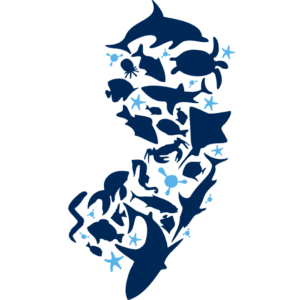 Thanks to New Jersey Digest for highlighting the UCI Blog in its list of “4 New Jersey Colleges Doing Blogs the Right Way.” The Jan. 28 article notes that our blog stands out for its focus on environmental issues and marine research work done by students and faculty.
Thanks to New Jersey Digest for highlighting the UCI Blog in its list of “4 New Jersey Colleges Doing Blogs the Right Way.” The Jan. 28 article notes that our blog stands out for its focus on environmental issues and marine research work done by students and faculty.